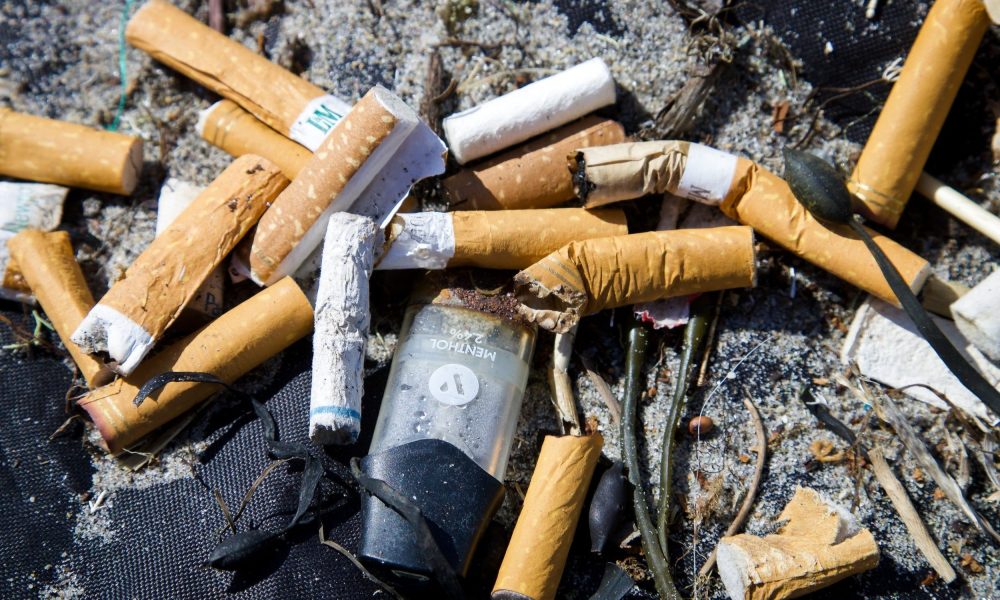Cigarette butts have topped the list of items collected during international coastal cleanups. Flicked onto beaches and tossed in parks, they are also the most commonly observed form of litter. They may look innocuous, but, as laboratory research shows, they are laced with chemicals that can lethally poison fish. In a world brimming with plastic pollution, they are a real nuisance.
They Are Made Of Plastic.
Cigarette butts, made of a man-made plastic called cellulose acetate and laced with chemicals, are incredibly toxic to the environment. They can take up to 10 years to degrade, and while they are breaking down, they release toxins into soils and waterways that can harm and kill living organisms, including animals and humans. They also leach harmful metals like cadmium and arsenic into the ecosystems around them. Studies show that a single cigarette butt in a liter of water can lethally poison fish. While many smokers understand that littering is wrong, recent studies and cigarette butt litter statistics show that they are still the biggest single type of trash that ends up in wild ecosystems and the oceans. They are tossed everywhere by smokers and non-smokers alike, from the back of someone’s car at a stoplight to the sidewalk during a work break, with no thought as to their impact on other living things.
The cigarette filter is technically biodegradable and can be recycled, but it would require massive collection schemes and processing that could negatively impact the environment.
They Are A Fire Hazard.
There is hardly an outdoor space, from a public roadway to a beach, that doesn’t host a sea of cigarette butts.
The lack of proper receptacles for discarded smoking materials is the main reason for this issue. It is a common sight to see a driver idling at a stoplight flick their cigarette to the ground and continue driving or a worker on break tossing a butt onto the sidewalk.
When tossed in explosive areas like mulch or black earth, the butts can start fires. They can also be a fire hazard when tossed in bedding or other flammable items.
Butts are made of cellulose acetate, which is a type of plastic, so when they litter the environment, they contribute to the growing piles of microplastics in oceans around the world. When ingested by wildlife, such as birds and marine animals, the butts leach toxic chemicals into waterways. These toxins are then passed up the food chain to humans, damaging ecosystems and causing illness. The chemicals from cigarette butts can also linger for years, even after the butt itself has been eroded into smaller bits of plastic pollution. The toxins are released slowly over time, so this ongoing problem requires long-term solutions.
They Are A Health Hazard.
Cigarette butts continue to be the single most littered item worldwide, despite the smoking rates decreasing. Whether flicked onto beaches, dropped into parks, or left behind on streets, these tiny, lightweight pieces of discarded cellulose acetate quickly become photodegraded to smaller and smaller particles that can eventually enter waterways and the ocean. In the ocean, they join a massive collection of anthropogenic debris floating on and suspended in the water. They are not only unsightly, but they also present a significant threat to wildlife. Ingestion of these plastic cigarette filters can be fatal for fish, birds, whales, and other marine creatures that mistake them for food.
Even if they are never ingested, the chemicals that leak from butts can remain in the environment for years. They leach out hundreds of toxic chemicals, including 69 known human carcinogens. Studies have shown that the leachates can be acutely toxic to freshwater cladoceran organisms and marine bacteria.
Adding to the danger, cigarette butts can be a fire hazard if they are left burning on the ground. Smokers may not be aware of the risk and may think that the heat from the burning cigarette is not enough to cause a fire.
They Are A Pollution Hazard.
Cigarette butts are a form of toxic plastic waste, and they also leak leachates that are harmful to marine life. These leachates contain over 7000 chemicals, of which 250 are known to be harmful and 69 of which are carcinogenic. They seep into soil, waterways, and beaches. They are a major nuisance and hazard for the health and safety of people who walk or play there and for wildlife and fish that ingest them.
When butts are dropped on sidewalks or tossed from cars, they quickly move into street drains and then to rivers, streams, beaches, and oceans. They are one of the most common litter collected during beach and coastal cleanups.
In addition, they trap and carry toxins in runoff and waterways, including arsenic, benzene, and lead. As a result, they can poison or kill fish and other marine animals that eat them. Moreover, they block the flow of water, which can damage vegetation and cause flooding and erosion. Cleaning up these toxic waste products takes incredible energy and resources. It could be cheaper and better for the environment to impose a fee on cigarettes that goes towards recycling or disposing of them properly.
